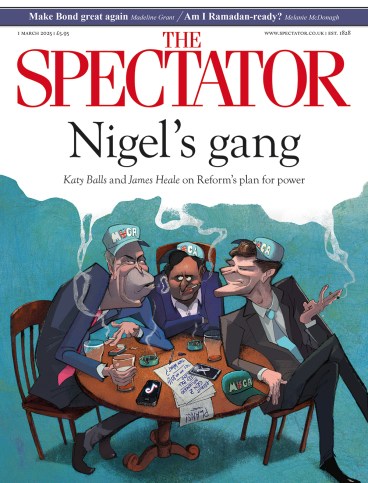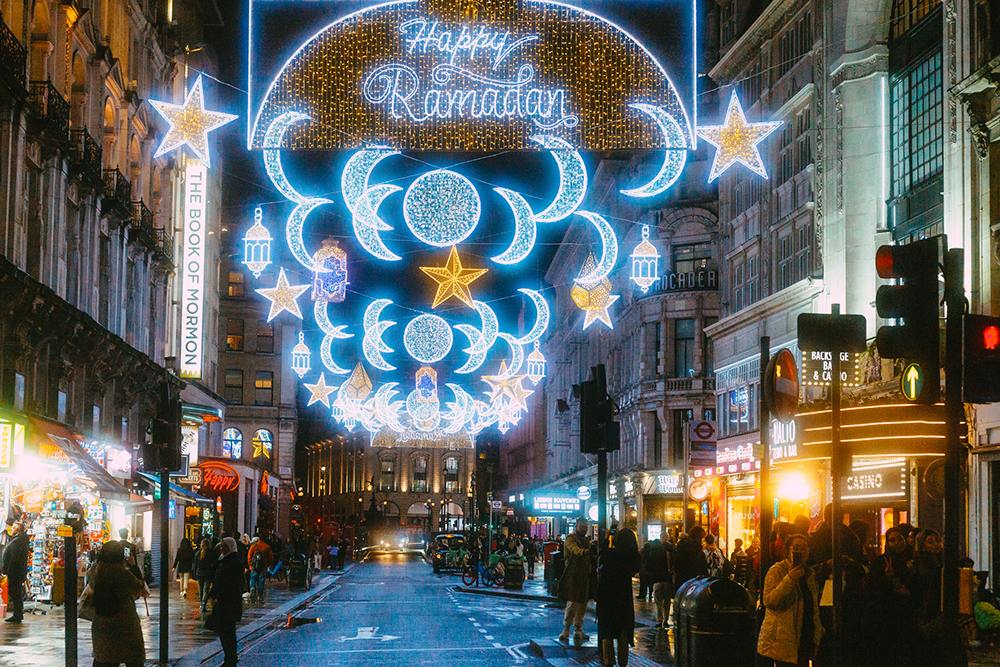
‘Are you Ramadan-ready?’ That was the poster in Sainsbury’s advertising its delicious range of fast-breaking foods (rice was one). And the striking thing about it was… the ‘you’. That ‘you’ means the normal customer, the default Sainsbury’s shopper.
Same with the email I got from the swanky Belgravia hair salon I used to visit:
Here, we understand that Ramadan is a time of reflection, renewal and spiritual focus – and we also know how important it is to take a moment for yourself amid the busy days of fasting and prayer. That’s why we are delighted to announce that our salon will be open late during Ramadan, offering evening appointments so you can indulge in a little luxurious self-care after Iftar [the fast-breaking meal after sundown].
Belgravia is next to Knightsbridge where wealthy Arabs are the norm, so the email wasn’t surprising – but again, the odd thing was that ‘you’: the assumption that the recipient is more likely than not to be Muslim. Naturally, if I’d got an email in April saying ‘Are you Easter-ready?’ I would have regarded it as par for the course – though, come to think of it, I’d probably have been a little surprised. Harrods is offering Iftar dining on its website: ‘Tuck into an Iftar feast, starting with Medjool dates accompanied by a refreshing hibiscus cooler.’
But then Ramadan, which starts this week, is now very much part of the calendar, much more than, say, Diwali. For the third year there will be a switch-on of the Ramadan Lights in London – previously on Oxford Street, this year in Coventry Street, where the message will be ‘Happy Ramadan’ until it changes to ‘Happy Eid’. (Have you noticed the asinine default greeting is Happy Everything, from Halloween to Fridays?)
Once again, it’s the assumption that we’re all up for it that’s a little curious. Ramadan Lights is supported by the Aziz Foundation which is also running an Iftar Food Trail where companies such as Shake Shack and Bone Daddies will be offering special Ramadan treats and discounts. In Leicester Square there’s an interactive light installation where visitors can press a button ‘to send beams of light soaring up the structure, visually representing the Spirit of Ramadan’.
Schools, too, are very much Ramadan-conscious. Several London boroughs have issued guidance to schools about how to do the season. Wandsworth, for instance, advises them to ‘take care in the timetabling of activities that no pupil who is fasting is required to do anything that would make her/him break the fast or become dehydrated or weak. This could include swimming, strenuous physical exercise or tasting food in food technology/cooking sessions’. Further, schools should use ‘Ramadan positively… by holding assemblies about it’. Which means, I suppose, that all pupils will be following the same framework.
This is pretty predictable in a society which is significantly less Christian than it used to be – fewer than half of us say we’re Christian – and with a large Muslim component: at least 6 per cent in the country and 15 per cent in London, according to official figures. But it’s still oddly unsettling that Islam is now the default ‘us’.
I’d be less conscious of it if it weren’t that the Christian equivalent, happening at the same time, is so very much off the radar. Lent, as we used to know, is the Christian equivalent of Ramadan and it starts next Wednesday. That begins the 40 days before Easter of fasting, abstinence and good works which is, as I never tire of pointing out, a much better time for giving things up than bloody Dry January.
How many schools are marking Lent, offering fish on Ash Wednesday, asking pupils what they’re giving up, or doing an assembly about the ash crosses on Christian foreheads? We’re pretty good about Shrove Tuesday as an excuse for pancakes, but it only makes sense as a pre-Lent thing in that the batter uses up the dairy and eggs that we once renounced for the next 40 days. A while back I suggested to a newspaper that I should write about giving up things for Lent. The editor looked baffled: ‘Why on earth would I want to read that?’
There are any number of elements of the Christian year that we’re too ignorant or indifferent to mark. What about Whitsun/Pentecost, previously quite a big deal? Remember Good Friday? But we can hardly blame Muslims if Ramadan and Eid are edging Lent and Easter off the calendar. Unless Christians, including those calling themselves cultural Christians (i.e. those who can’t be arsed to go to church), actually make a big deal about our feasts and fasts, we can’t expect others to take them seriously either.








Comments